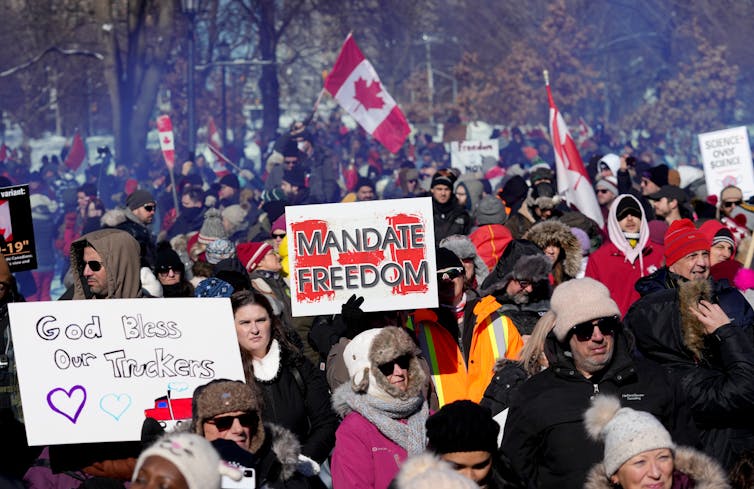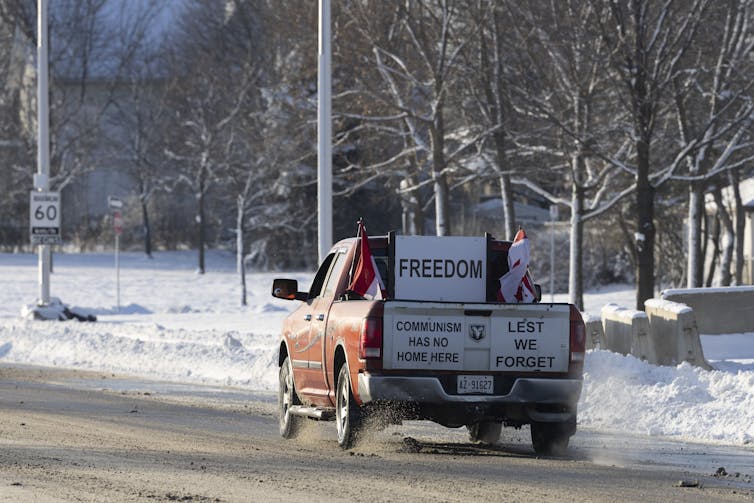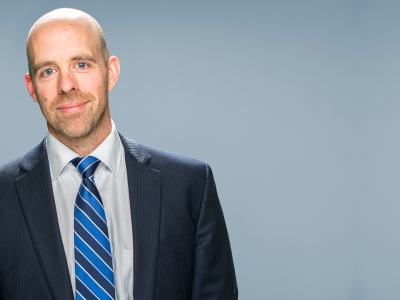By Sydney Chapados
This article is republished from The Conversation under a Creative Commons licence. All photos provided by The Conversation from various sources.
The “freedom convoy” demands COVID-19 mandates must end to restore the right of the Canadian citizen to make their own decisions free from control and influence.
The belief that people are free to make their own decisions, so long as they are outside of government control, serves a specific purpose: it emphasizes the amount of power exercised by the government, while obscuring other forms of power that influence and shape their behaviour and choices.
The so-called “freedom fighters” who reject COVID-19 mandates are not any more free or autonomous than the person who follows mandates. Rather, they are governed through different relations of power and knowledge.
Investigating how power is highlighted and obscured in particular moments can help people think critically about resistance, freedom and the post-pandemic future Canada wants to build.
Freedom per the convoy
Convoy participants have waved signs that read “Mandate Freedom,” “End the Mandates” and “No More Restrictions,” among others.
Many signs are infused with anti-government sentiments, including the “Don’t Tread On Me” flag associated with the American Revolution — it is important to note that the protest has been condemned for including symbols of white supremacy and violence.

THE CANADIAN PRESS/Nathan Denette
According to the mission statement from the convoy website, the goals of the protest are to:
1) End vaccine mandates that are “in violation of our human rights.”
2) End “totalitarian” measures that cause “economical and mental damage.”
3) Reopen businesses.
4) Free children from school closures.
5) Ensure freedom from the current administration.
The statement also argues that continuing the mandates despite the ongoing spread of COVID-19 demonstrates that the Canadian government has been using mandates for their own purposes. They argue that along with the media and scientific community, the government is using the mandates to exercise control over the population and normalize overreach.
Statephobia
This resistance to, and fear of, the government is not unique to COVID-19. French philosopher Michel Foucault argued in the 1970s that “statephobia,” or fear of the state, became prominent through the 20th century due to the rise and fall of communism, Nazism and post-war planning, leading to economic recession.
These crises led to a strong shift towards limiting the role of government, out of concern that too much government intervention into the economy and civil society would lead to social and economic problems.
Statephobia has the tendency to lump multiple and distinct forms of government together into a single, monstrous state with significant power. This belief is on display at the “freedom convoy,” where they see government mandates, closures and lock downs as proof of the spread of communism, Nazism and an infringement on the rights of the individual.
The convoy’s comparison of Canada’s current government to Nazi Germany draws on previously existing statephobia from these historical events, and falsely conflates today’s Canadian state with prior state forms.
Crises of government
Foucault argued that the rise of statephobia led to a “crisis of government” in which citizens lost faith in their heads of state. To maintain their legitimacy, governments needed to balance their desire to manage individuals so that they become more efficient, healthier, and hardworking, without noticeably infringing on individual human rights.
To address this crisis, the management of the population shifted away from the realm of government towards nonpolitical entities like healthcare, therapy, religion, education and social services. People are not only governed through the state, but also nonpolitical entities that provide support for people.

THE CANADIAN PRESS/Nicole Osborne
This crisis of government has been at the forefront of COVID-19. Subtle methods of regulation have been overtaken by overt methods, like restrictions on public space.
The government now faces a crisis of legitimacy, as there are measures in place that act against the autonomy of the individual.
Other forms of power
Convoy participants are questioning the legitimacy of the government. Recent attempts to remove mandates might be evidence of public officials scrambling to regain lost legitimacy.
The idea that resisting and removing these mandates will lead to a freer state obscures the fact that people were governed before COVID-19 mandates, and will continue to be governed after they are gone.
Resisting the state out of fear of previous — often unrelated — crises can cause people to reject measures that help them, and ignore other non-governmental forms of power that harm us.
Rather than resisting orders simply because they come from the government, Canadians should reflect on the multiple forms of power that influence them and to what extent. The scepticism that is applied to mandates simply because they come from the government might be wrongfully placed.
Instead of succumbing to statephobia and rejecting public health measures altogether for the sake of assumed freedom, people should think critically about how these measures can be mobilized in service of the population to move towards a post-COVID-19 future.
![]()
Friday, February 18, 2022 in The Conversation
Share: Twitter, Facebook



